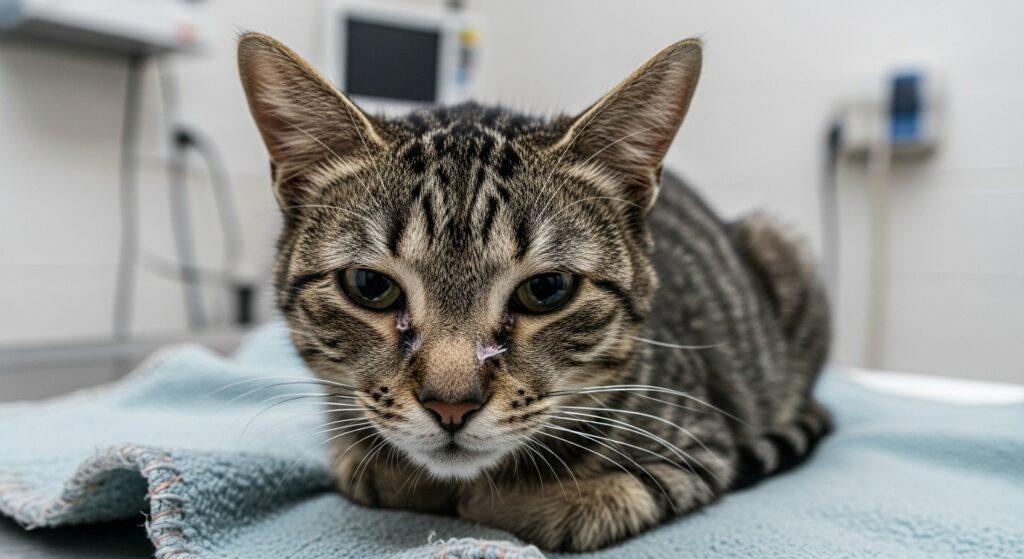As a cat parent, understanding the Common Viral Diseases of Cats can truly make a life-saving difference for your feline companion. Nigerian cat owners face unique challenges because viral infections spread easily in multi-cat homes, shelters, and outdoor environments. Since many of these viruses have no cure, staying informed gives you a powerful advantage. While caring for your pet, partnering with trusted veterinary experts ensures your cat receives an accurate diagnosis, timely treatment, and personalized preventive care.
Keeping your cat healthy goes beyond feeding and sheltering. It requires knowing the illnesses that threaten your pet the most. Because these viral diseases are widespread globally and locally, recognizing their symptoms early helps improve outcomes dramatically. Although this may feel overwhelming at first, learning how each virus behaves will empower you to take practical preventive steps for your cat.
5 Common Viral Diseases of Cats in Nigeria
1. Feline Immunodeficiency Virus (FIV)
Feline Immunodeficiency Virus weakens a cat’s immune system, making even minor infections dangerous. Most infected cats show no immediate symptoms; however, signs gradually appear as the immune system deteriorates. Cats may develop fever, weight loss, swollen gums, recurring skin infections, or diarrhea.
Transmission usually occurs through deep bite wounds, which is why free-roaming and unneutered male cats face the highest risk. Fighting or territorial aggression exposes them to infected saliva and blood. Indoor cats rarely contract FIV unless they encounter infected cats.
Although FIV has no cure, supportive care can significantly extend a cat’s life. Regular checkups, immune-boosting diets, prompt treatment of secondary infections, and routine monitoring help keep infected cats stable. When you work closely with your veterinarian, managing FIV becomes less stressful for both you and your pet.
2. Feline Leukemia Virus (FeLV)
Among the Common Viral Diseases of Cats, Feline Leukemia Virus stands out as one of the most contagious and dangerous. FeLV suppresses the immune system and increases a cat’s risk of developing cancer, anemia, and chronic infections. Many infected cats lose weight steadily, experience persistent fever, or suffer recurring respiratory issues.
Unlike FIV, FeLV spreads through everyday interactions. Grooming, sharing food bowls, nursing, or using the same litter box can transmit the virus. Young kittens are especially vulnerable because their immune systems are still developing.
FeLV has no cure, but early detection improves the quality of life. Supportive therapies, strict indoor living, regular veterinary exams, and immune-support medications help maintain comfort. Vaccination remains the strongest preventive measure, especially for kittens or cats that spend time outdoors.
RECOMMENDED:
Lhasa Apso Puppies for Sale in Lagos & Adoption Information Guide
Top 10 Cat Hotels in Lekki, Lagos
Must-Have Dog Medications and Supplements: What to Give, When and Why
3. Feline Herpesvirus (FHV-1)
Feline Herpesvirus, a major cause of upper respiratory infections, affects a large percentage of cats in Nigeria and worldwide. Many cats become lifelong carriers after the first infection. Stress, environmental changes, or illness can reactivate the virus, causing recurrent flare-ups.
Typical symptoms include sneezing, nasal discharge, red or watery eyes, coughing, fever, and loss of appetite. Eye complications, including corneal ulcers, occur frequently and require immediate veterinary attention.
The virus spreads through eye, nose, or mouth secretions. Crowded homes, shared bowls, or grooming tools increase transmission risks. Treatment focuses on symptom relief because the virus remains in the body permanently. Antiviral medication, immune support, stress reduction, and good hygiene help reduce recurrence.
Regular checkups at Dulham Veterinary Clinic ensure long-term monitoring and proper management of FHV-1.
4. Feline Calicivirus (FCV)
Feline Calicivirus also contributes to widespread upper respiratory infections. Unlike herpesvirus, FCV often causes painful oral ulcers on the tongue, gums, or lips. Cats may drool excessively, avoid eating, or become lethargic. Some strains trigger high fever, swollen joints, or severe respiratory distress.
Because FCV survives on surfaces for up to 10 days, infection spreads quickly in homes, catteries, and shelters. Contact with contaminated bowls, hands, bedding, or toys can introduce the virus to a healthy cat. Regular cleaning with a bleach solution reduces the risk significantly.
Treatment includes antibiotics for secondary infections, pain relief for ulcers, and supportive care such as hydration. Home humidifiers help ease congestion. Preventive vaccination (usually part of the FVRCP vaccine) offers strong protection and is highly recommended for Nigerian cats.
5. Feline Panleukopenia Virus (FPV)
Feline Panleukopenia, also known as feline distemper, is one of the deadliest viral infections in cats. The parvovirus attacks rapidly dividing cells in the intestines, bone marrow, and immune system. Symptoms such as vomiting, diarrhea, high fever, dehydration, and collapse appear suddenly and worsen quickly.
FPV spreads through urine, feces, blood, or even contaminated objects. The virus remains in the environment for up to a year, which increases the risk dramatically for unvaccinated cats. Kittens face the highest fatality rates.
Early and aggressive treatment improves the chance of survival. Therapy includes intravenous fluids, electrolytes, antibiotics, and hospitalization. Cats that recover develop lifelong immunity. Because this disease is almost entirely preventable, vaccination is absolutely essential for kittens and adult cats alike.
Preventing Viral Diseases in Nigerian Cats
Prevention offers the strongest defense against these Common Viral Diseases of Cats. Vaccination remains the cornerstone of protection. Core vaccines such as FVRCP shield your cat from FHV-1, FCV, and FPV, while optional vaccines like FeLV may be crucial depending on your cat’s lifestyle.
Maintaining strict hygiene reduces exposure. Washing bowls daily, disinfecting litter boxes, and keeping your cat indoors help minimize infection risks. Reducing stress through stable routines, environmental enrichment, and gentle handling also limits viral flare-ups.
Regular veterinary visits allow early diagnosis, timely vaccinations, and proper monitoring of chronic conditions. Dulham Veterinary Clinic experienced professionals ensures your cat receives personalized preventive care tailored to Nigerian environments.
Protect Your Cat Through Consistent Preventive Care
Your cat depends on you for safety, comfort, and good health, which makes learning the Common Viral Diseases of Cats incredibly important. While some of these diseases have no cure, you can still protect your cat through timely vaccinations, responsible management, and early intervention. Staying proactive helps stop minor symptoms from turning into life-threatening emergencies.
To safeguard your cat’s future, schedule a wellness check or vaccination appointment today with Dulham Veterinary Clinic and give your feline companion the healthy, happy life they deserve.
Phone Us
0806 632 9826
Visit Us
No 23 Crown Court Estate 2, Orunbe close , Oniru. Victoria Island, Lagos.
No. 3 Isiokpo Street, Phalga, Port Harcourt
Mail Us
help@dulhamvetclinic.com
Join our WhatsApp Community – learn from other pet parents, and be the first to know about exclusive offers. Click to join the group
Frequently Asked Questions on Common Viral Diseases of Cats in Nigeria
1. What are the most common viral diseases affecting cats in Nigeria?
The most common viral diseases affecting cats in Nigeria are Feline Immunodeficiency Virus (FIV), Feline Leukemia Virus (FeLV), Feline Herpesvirus (FHV-1), Feline Calicivirus (FCV), and Feline Panleukopenia Virus (FPV). These viruses are highly contagious and can cause serious or lifelong illness without proper prevention.
2. How can I tell if my cat has a viral infection?
You can tell your cat may have a viral infection if they show symptoms such as sneezing, fever, coughing, weight loss, diarrhea, eye discharge, mouth ulcers, or sudden fatigue. Any sudden behavior change or refusal to eat also signals possible infection.
3. Can indoor cats in Nigeria still get viral diseases?
Indoor cats can still get viral diseases if they come in contact with infected cats, contaminated objects, or humans who have handled infected animals. Although the risk is lower, vaccination remains essential for indoor cats.
4. Is there a cure for FIV or FeLV in cats?
There is no cure for FIV or FeLV. Treatment focuses on managing symptoms, boosting immunity, preventing secondary infections, and improving quality of life. Early detection and continuous veterinary care help infected cats live longer and more comfortably.
5. How long does feline calicivirus survive on surfaces?
Feline calicivirus can survive on contaminated surfaces for up to 10 days. This makes thorough cleaning and disinfection extremely important, especially in homes with multiple cats or in shelter environments.
6. What vaccines are essential for cats in Nigeria?
Core vaccines for Nigerian cats include the FVRCP vaccine, which protects against FHV-1, FCV, and FPV. The FeLV vaccine is also recommended for kittens and outdoor cats. Vaccinating early and keeping boosters current is key to effective protection.

